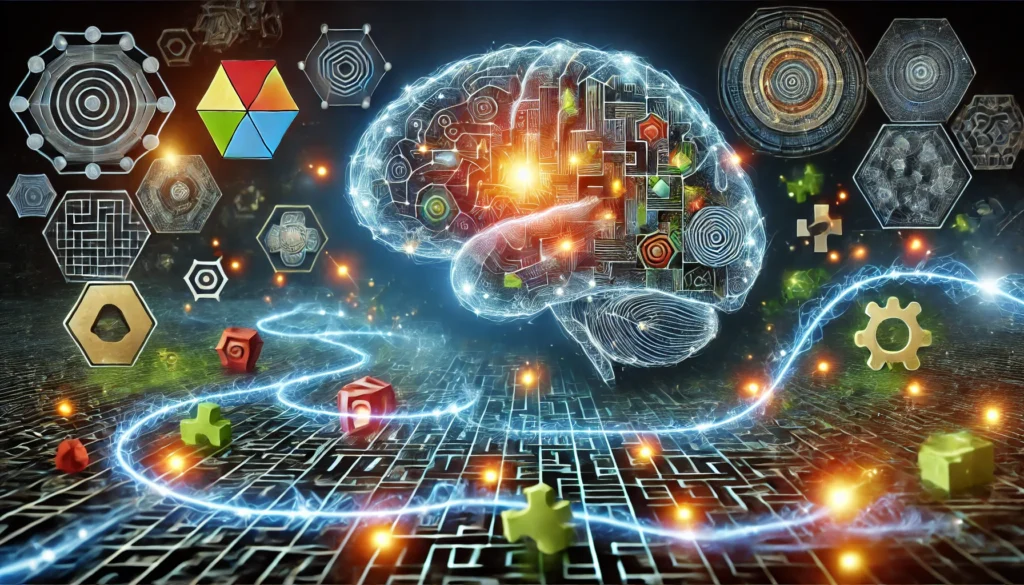In our fast-paced, information-saturated world, the quest for cognitive enhancement has led many to explore brain games and cognitive exercises. But do these tools genuinely bolster mental faculties, or are they merely a passing trend? This article delves into the effectiveness of brain games, providing an insightful analysis for health and wellness coaches, science journalists, and biohackers alike.
You may also like: Top Apps to Boost Your Brainpower
The Evolution of Brain Games
Brain games have evolved significantly over the years, transitioning from simple puzzles to sophisticated digital platforms. Historically, games like chess and Sudoku have been lauded for their mental benefits. However, the digital revolution has ushered in a plethora of brain training apps like Lumosity and the Impulse app, each promising to sharpen our cognitive skills.
Historical Context
Ancient civilizations recognized the importance of mental exercises. The Greeks, for instance, practiced mnemonics—a technique to enhance memory through vivid imagery and associations. Mnemonics were not just tools for remembering, but an art form that required creativity and imagination. This practice laid the groundwork for modern memory enhancement techniques.
Fast forward to the 20th century, and games like crossword puzzles became popular as both entertainment and cognitive stimulants. They were featured in newspapers worldwide, becoming a daily ritual for many, challenging both vocabulary and problem-solving skills. The accessibility and simplicity of these puzzles made them a staple for cognitive engagement across generations.
Today, the digital age offers a myriad of brain training apps. These modern tools are designed to challenge various cognitive domains, from memory to attention, aiming to enhance overall mental acuity. These apps provide personalized experiences, adapting to the user’s progress, and offering a wide range of cognitive exercises tailored to individual needs.
The Rise of Digital Platforms
With the advent of technology, brain games have transformed from paper-based puzzles to interactive digital experiences. These platforms offer convenience and accessibility, allowing users to engage in cognitive exercises anytime and anywhere. The integration of artificial intelligence in these games has enabled more precise tracking of progress and customization of challenges.
Digital platforms also foster a sense of community among users. Many apps include features that allow players to compete or collaborate with friends, adding a social dimension to cognitive training. This gamification of brain exercises not only makes them more engaging but also encourages consistent participation.
Popular Brain Training Apps
Apps like Lumosity and the Impulse app have become household names in the realm of cognitive training. Lumosity, for instance, offers a variety of games that target different cognitive skills, from speed to problem-solving. The app uses data from millions of users to refine its exercises, ensuring they are both challenging and effective.
Impulse, on the other hand, focuses on short, daily exercises that fit seamlessly into busy schedules. Its minimalist design and user-friendly interface make it accessible to users of all ages. Both apps emphasize the importance of regular practice, encouraging users to dedicate a few minutes each day to mental training.
How Do Cognitive Exercises Work?
Cognitive exercises are structured activities designed to improve specific brain functions. They operate on the principle of neuroplasticity—the brain’s ability to reorganize itself by forming new neural connections throughout life. Let’s explore how these exercises aim to boost cognitive performance.
Neuroplasticity: The Brain’s Secret Weapon
Neuroplasticity is the brain’s inherent capacity to adapt and change. This remarkable ability means that with the right stimuli, the brain can improve its efficiency and processing power. Neuroplasticity allows the brain to recover from injuries, learn new skills, and adapt to new situations, underscoring the importance of continuous cognitive engagement.
Cognitive exercises leverage this trait by providing targeted tasks that stimulate brain regions responsible for memory, attention, and problem-solving. These tasks are designed to challenge the brain, encouraging the formation of new neural pathways. Over time, this leads to improved cognitive function and greater mental agility.
The impact of neuroplasticity is not limited to young minds. Research indicates that the adult brain retains this flexibility, although it may require more effort to achieve the same level of change. This highlights the potential of cognitive exercises to support lifelong learning and mental resilience.
Targeted Cognitive Domains
Brain games often focus on specific cognitive domains:
- Memory: Exercises designed to enhance recall and retention. These may involve memorizing sequences of numbers or words, which helps improve the ability to store and retrieve information.
- Attention: Tasks that improve focus and reduce distractions. These exercises often require users to concentrate on a specific task amidst various distractions, enhancing their ability to maintain attention over time.
- Problem-Solving: Games that encourage critical thinking and creativity. They challenge users to think outside the box, fostering innovative solutions to complex problems.
By engaging these areas, brain games aim to foster a more agile and responsive mind. Each domain targets different aspects of cognitive function, providing a comprehensive approach to mental enhancement.

The Role of Feedback and Adaptation
One of the key components of cognitive exercises is feedback. Immediate feedback allows users to understand their performance and areas for improvement. This feedback loop is crucial for effective learning, as it guides users towards more efficient strategies.
Adaptation is another important aspect of these exercises. As users progress, the difficulty of tasks should increase to continue challenging the brain. This ensures that cognitive exercises remain effective and engaging, preventing plateauing and promoting ongoing development.
Effectiveness of Brain Training Games
The effectiveness of brain training games has been a subject of intense debate within the scientific community. While proponents argue for their benefits, critics question their long-term efficacy. Let’s examine the evidence.
Scientific Studies and Findings
Numerous studies have investigated the impact of brain games on cognitive performance. A landmark study published in Nature found that while brain training games improved task-specific performance, they did not necessarily enhance general cognitive abilities. This suggests that while brain games may enhance certain skills, they may not translate to broader cognitive improvements.
However, other research suggests that consistent engagement with brain exercises can lead to modest improvements in cognitive function. A study by the University of Cambridge found that regular use of brain training apps resulted in better memory and reasoning skills in older adults. These findings indicate that while the effects may be subtle, they are not insignificant.
It is important to note that individual differences play a significant role in the outcomes of brain training. Factors such as age, baseline cognitive function, and motivation can influence the effectiveness of these exercises. This underscores the need for personalized approaches to cognitive training.
The Placebo Effect
The placebo effect is a psychological phenomenon where individuals experience perceived improvements due to their belief in a treatment’s efficacy. Some experts argue that the benefits of brain games may be partially attributed to this effect. Participants who believe in the power of brain training are more likely to report improvements, regardless of actual cognitive changes.
While the placebo effect can enhance motivation and engagement, it also highlights the importance of objective measures in evaluating the effectiveness of brain games. Relying solely on subjective reports may lead to overestimating their benefits.
Despite the potential influence of the placebo effect, brain games can still provide value by fostering a positive attitude towards cognitive health. Encouraging individuals to take an active role in their mental well-being can have beneficial outcomes, even if some improvements are perceived rather than actual.
Long-Term vs. Short-Term Gains
The debate over brain games often centers around the distinction between short-term and long-term cognitive gains. Short-term improvements, such as enhanced focus during gameplay, are frequently observed. However, translating these gains into lasting cognitive benefits remains a challenge.
Critics argue that brain games might provide a temporary boost in performance, but without sustained engagement, these benefits may diminish over time. This highlights the need for ongoing research to determine the most effective strategies for achieving long-term cognitive enhancement.
Do Brain Games Improve Mental Health?
Beyond cognitive performance, brain games are often marketed as tools for enhancing mental health. But do they truly deliver on this promise?
Stress Reduction and Mental Well-being
Engaging in brain games can provide a sense of accomplishment and enjoyment, potentially reducing stress and enhancing overall well-being. The immersive nature of these games offers a mental escape, allowing players to momentarily disconnect from daily stressors. This can lead to improved mood and reduced anxiety levels.
Brain games also promote relaxation by shifting focus away from stressors, offering a constructive outlet for managing negative emotions. The structured nature of these exercises can provide a sense of control and predictability, contributing to a more balanced mental state.
While brain games are not a substitute for professional mental health interventions, they can serve as a complementary tool for managing stress and promoting well-being. Their accessibility and ease of use make them a practical option for individuals seeking to enhance their mental health.
Combatting Cognitive Decline
For older adults, brain games may serve as a preventive measure against cognitive decline. By stimulating mental activity, these exercises could help maintain mental sharpness and delay the onset of age-related cognitive disorders. The potential benefits of brain games for this demographic are supported by research indicating that cognitive engagement can slow cognitive decline.
Regular engagement in cognitive exercises may also foster a sense of purpose and fulfillment, contributing to a higher quality of life in older age. The social aspect of some brain games can encourage interaction and reduce feelings of isolation, further enhancing their value for older adults.
However, it is important to approach brain games as part of a broader strategy for healthy aging. Incorporating physical activity, social interaction, and a balanced diet can amplify the benefits of cognitive exercises, promoting holistic well-being.
Enhancing Emotional Resilience
Brain games can also play a role in enhancing emotional resilience. By challenging the brain to adapt to new scenarios and solve complex problems, these exercises can build mental toughness and coping skills. This increased resilience can help individuals better manage life’s challenges, reducing the impact of stress and adversity.
The process of overcoming obstacles in brain games can mirror real-life situations, providing a safe environment for practicing problem-solving and emotional regulation. As players develop these skills, they may find themselves better equipped to handle difficult situations with confidence and composure.

Practical Advice for Incorporating Brain Games
For health and wellness coaches, science journalists, and biohackers, understanding how to effectively incorporate brain games into daily routines is crucial.
Choosing the Right Games
Select games that align with your cognitive goals. For memory enhancement, opt for games that challenge recall and recognition. Games that require matching pairs or remembering sequences are excellent choices for boosting memory. For improved focus, choose tasks that require sustained attention, such as those that involve tracking moving objects or identifying patterns.
Consider games that offer a variety of difficulty levels and adapt to your progress. This ensures that you remain challenged and engaged, preventing boredom and enhancing motivation. Reading reviews and seeking recommendations from trusted sources can also help in selecting high-quality games.
Consistency is Key
Regular practice is essential for reaping the benefits of brain games. Aim for short, consistent sessions rather than sporadic, lengthy ones to maintain engagement and motivation. Consistency helps reinforce neural pathways, leading to more significant cognitive gains over time.
Incorporate brain games into your daily routine by setting aside a specific time for cognitive training. This can be during breaks, commutes, or before bed. Creating a habit around brain games increases the likelihood of sustained engagement and maximizes their potential benefits.
Tracking your progress can also enhance motivation. Many brain training apps provide metrics on your performance, allowing you to see improvements and set new goals. Celebrating small victories can boost confidence and encourage continued participation.
Integrating with a Holistic Approach
Brain games should complement other cognitive enhancement strategies, such as physical exercise, a balanced diet, and adequate sleep. A holistic approach ensures comprehensive brain health and optimization. Physical activity, for instance, increases blood flow to the brain and supports neuroplasticity, enhancing the effectiveness of cognitive exercises.
Nutrition also plays a crucial role in cognitive health. Consuming a diet rich in antioxidants, omega-3 fatty acids, and other brain-boosting nutrients can support cognitive function and enhance the benefits of brain games. Adequate sleep is essential for memory consolidation and overall brain performance, further amplifying the impact of cognitive training.
By integrating brain games with these lifestyle factors, you create a synergistic effect that promotes optimal brain health and performance. This holistic approach ensures that you are addressing all aspects of cognitive well-being, leading to more significant and lasting improvements.
Conclusion: The Future of Brain Games
While brain games offer potential cognitive benefits, they are not a panacea for all mental challenges. As scientific research continues to evolve, our understanding of these tools will deepen, providing clearer insights into their true efficacy. For now, brain games remain a valuable component of a broader cognitive enhancement strategy, offering both entertainment and potential mental gains.
Ongoing Research and Innovations
The field of brain games is continually evolving, with ongoing research exploring new ways to enhance their effectiveness. Innovations such as virtual reality and augmented reality are being integrated into cognitive exercises, providing more immersive and engaging experiences. These technologies offer the potential to simulate real-life scenarios, enhancing the transfer of cognitive skills to everyday activities.
Researchers are also investigating the use of artificial intelligence to create more personalized and adaptive brain training programs. By analyzing user data, AI can tailor exercises to individual needs, maximizing cognitive gains and ensuring that users remain challenged.
The Role of Brain Games in Cognitive Health
As awareness of cognitive health grows, brain games are becoming an increasingly popular tool for individuals seeking to enhance their mental well-being. They offer an accessible and enjoyable way to engage in cognitive training, appealing to a wide range of users. Brain games can serve as a gateway to broader discussions about cognitive health, encouraging individuals to take proactive steps towards mental wellness.
While brain games alone may not provide a comprehensive solution for cognitive enhancement, they play a valuable role in a multifaceted approach to brain health. By complementing other strategies, such as physical activity and nutrition, brain games can contribute to a well-rounded cognitive enhancement regimen.

Empowering Your Cognitive Journey
Whether you’re a health and wellness coach guiding clients, a science journalist exploring the intricacies of brain health, or a biohacker seeking optimization, understanding the role of brain games can empower your cognitive journey. By staying informed and approaching brain games with a critical yet open-minded perspective, you can harness their potential to enhance mental acuity and overall well-being.
Embracing brain games as part of a broader cognitive strategy allows you to tailor your approach to your unique needs and goals. By leveraging the power of cognitive exercises, you can take control of your mental health and unlock your full cognitive potential.
Further Reading:
Do “Brain-Training” Programs Work?
Why brain-training games don’t work, according to a behavioral scientist
Do Brain-Training Apps Really Work?
Important Note: The information contained in this article is for general informational purposes only, and should not be construed as health or medical advice, nor is it intended to diagnose, prevent, treat, or cure any disease or health condition. Before embarking on any diet, fitness regimen, or program of nutritional supplementation, it is advisable to consult your healthcare professional in order to determine its safety and probable efficacy in terms of your individual state of health.
Regarding Nutritional Supplements Or Other Non-Prescription Health Products: If any nutritional supplements or other non-prescription health products are mentioned in the foregoing article, any claims or statements made about them have not been evaluated by the U.S. Food and Drug Administration, and such nutritional supplements or other health products are not intended to diagnose, treat, cure, or prevent any disease.


